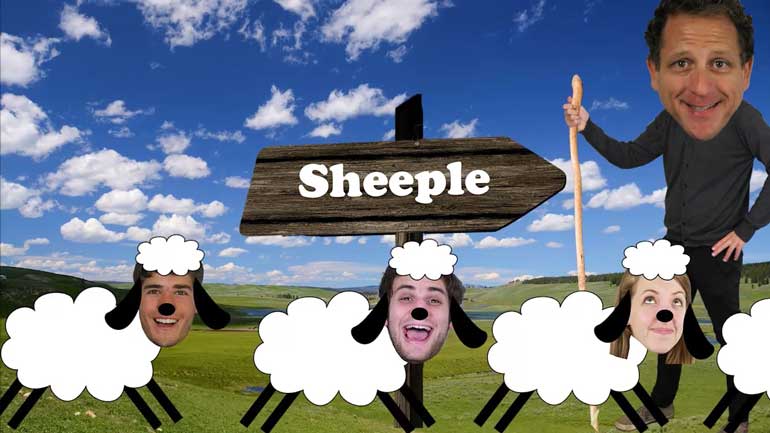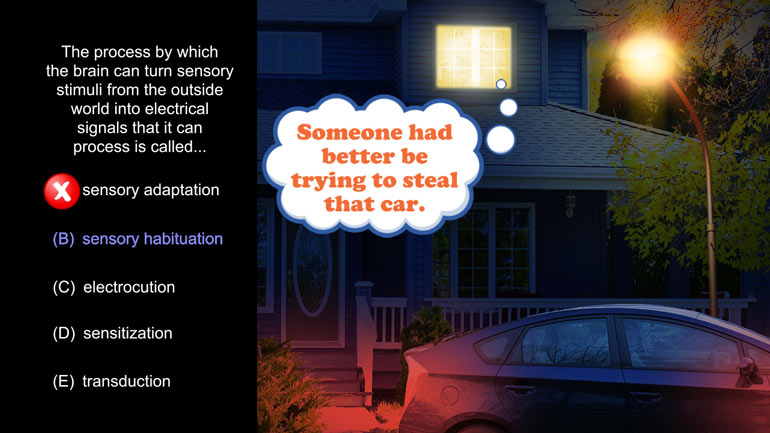ShmoopTube
Where Monty Python meets your 10th grade teacher.
Search Thousands of Shmoop Videos
AP Psychology 3.3 History and Approaches 6 Views
Share It!
Description:
AP Psychology 3.3 History and Approaches. Which school of thought matches the description given?
Transcript
- 00:04
And here's your shmoop du jour brought to you by happiness we [Man waving]
- 00:07
were gonna say brought to you by apathy but right here's our question which
- 00:12
school claims that observable actions and habits of a species should be
- 00:17
studied instead of their thought processes and here are potential answer
- 00:21
well we'll start by
Full Transcript
- 00:25
given answer C the boot cognitive by definition is the study of mental [Doctor looks inside mans head]
- 00:30
processes otherwise known as the exact opposite of what we're looking for it's
- 00:34
kind of like looking for the match to a sock and finding a large toad instead [Girl searches for sock and picks up a toad]
- 00:38
Not tha toads are the opposite of socks but well you get the idea... humanistic
- 00:42
psychology is also more about thought than behavior it refers to a
- 00:46
psychological perspective that grew popular in the middle of the 20th
- 00:49
century and focused on the individuals goal of self-actualization which is just [Dart lands in a dart board]
- 00:53
a fancy way of saying discovering one's own meaning in life which is just a
- 00:58
fancy way of saying being happy. E isn't what we're looking for either
- 01:02
evolutionary psychology attempts to explain traits such as memory, language
- 01:07
and perception as a result of natural selection Thank You Darwin in short it's
- 01:12
looking at how evolution has shaped the mind and behavior and has nothing to do [Animals morphing into new species]
- 01:17
with observable actions or habits and even though it's pretty nifty branch of
- 01:21
psychology it still can't answer why our little brother has yet to evolve into a [Little brother on a branch and big brother appears]
- 01:24
normal non annoying person... biological psychology is the study of the
- 01:29
biological brain and the way in which its development contributes to the
- 01:33
behavior of humans and animals and hey speaking of brain development and think [Person with brain for a head writing baby names]
- 01:37
about this the brain named itself while this branch does deal with behavior it
- 01:43
focuses on the neurobiological level long story short it's not quite what
- 01:47
we're looking for now that we've wrapped our self-named brains around that fun [Girl wrapping a brain]
- 01:51
fact let's take a look at B as in behavioral psychology, well behavioral
- 01:56
psychology was created as a reaction to the early cognitive psychological work
- 02:00
being done throughout the early 20th century early behaviorist felt that
- 02:04
attempts to understand human thought processes were futile and shallow no [Group of men stood looking inside a man's head]
- 02:07
doubt due in part to the limited technology available at the time
- 02:10
and that real and honest research could only be conducted on observable actions [Doctors high-fiving]
- 02:15
and habits that sounds like B is our winner now to return to our favorite
- 02:19
habit well hey the internet wont browse itself....
Up Next
AP Psychology 2.2 Social Psychology. Which of the following was an independent variable manipulated in Asch's research?
Related Videos
AP Psychology 1.1 Personality. According to Freud, these three parts of personality are constantly in conflict.
AP Psychology 1.1 Sensation and Perception. The process by which the brain can turn sensory stimuli from the outside world into electrical signals...
AP Psychology 1.1 Social Psychology. Which of the following best describes social psychology?
AP Psychology 1.1 States of Consciousness. Who conducted research on REM sleep deprivations?




